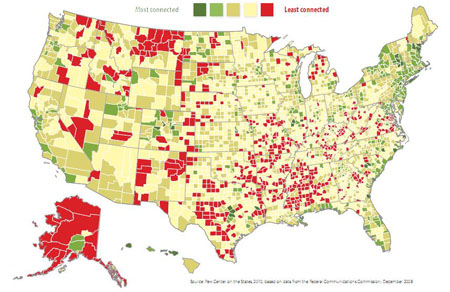In recent weeks, the development of the United States’ broadband infrastructure has taken a few sharp body blows. First was the Google/Verizon net neutrality furore and now research results that show the rollout of universal broadband is not deemed a priority or even necessary by the majority of Americans.
According to the Pew Internet Project’s latest research, at least 52% of Americans believe that President Obama’s $7.2 billion in stimulus funds should be spent on other areas rather than the country’s broadband infrastructure. This comes as somewhat of a shock, especially at a time when most of the world’s developed countries are striving to claim the bejewelled prize of a true networked nation.
According to the US government over 100 million Americans do not currently have access to a broadband connection. This figure is significantly higher to that which was much lauded during the Bush administration. During this time it was claimed that 99% of Americans had access to high-speed Internet. The difference between the two figures is quite significant.
The current state of the United States’ broadband development was revealed earlier in the summer when the Pew Internet Project published a map showing broadband penetration across the country (see map). As to be expected, it is the rural parts of America that are the most underserved and while a number of articles herald the impact of the stimulus money on these areas, it is alarming to note that many of the residents may not actually want improved broadband access.
 As such, I cannot help but wonder if the US needs to look to the UK for help or at least a role model. In the UK, we may not have any stimulus money, but we do have a Digital Champion - Martha Lane Fox. In a previous post, I wrote about the UK’s digital agenda and the ambition of the Digital Champion’s Race Online 2012 campaign that’s designed to develop an educated, if not necessarily, networked nation. The key here is to ensure that everyone has an understanding of the Internet, that fears and concerns about it are quashed and that people start to see how it can be used to better their lives.
As such, I cannot help but wonder if the US needs to look to the UK for help or at least a role model. In the UK, we may not have any stimulus money, but we do have a Digital Champion - Martha Lane Fox. In a previous post, I wrote about the UK’s digital agenda and the ambition of the Digital Champion’s Race Online 2012 campaign that’s designed to develop an educated, if not necessarily, networked nation. The key here is to ensure that everyone has an understanding of the Internet, that fears and concerns about it are quashed and that people start to see how it can be used to better their lives.
From what I can see, the US currently does not have this. Yes, Obama’s doing a great job of promoting the need for universal broadband but who at the grassroots levels is really pushing this? Who’s organising classes or more informal clubs to encourage those currently without access to take that crucial first online step?
Ultimately, it takes more than money to develop a networked nation.
Do you agree? Are you aware of any Digital Champions in your region? If so, I’d be interested to hear from you.
